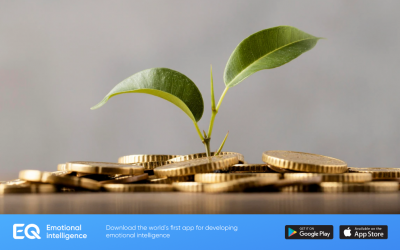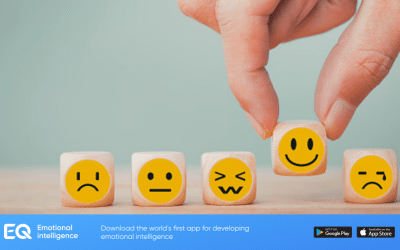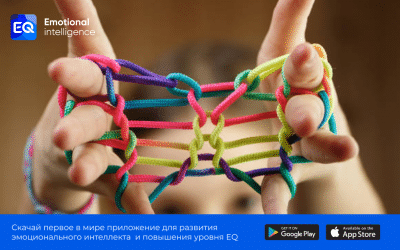Emotional relationships in a couple
Emotional intelligence is seen as understanding the emotional state of people and oneself. Interpersonal relationships, in turn, are considered as the relationship between people, manifested in communication. A high level of skills and abilities in the...
A simple and effective technique for dealing with any fear.
Why are we afraid? Where does all this bunch of thought and feelings come from, sitting in a tangled ball in the head and not allowing you to relax and enjoy life? There can be many reasons, they are always mixed, and everyone has their own set and way of formulating....
Useful trend – mindfulness
At the moment, the main global trend is mindfulness. Mindfulness is a concept that describes the state of continuous awareness of ongoing experiences. When they say “be here and now”, “focus on the moment”, or “slow down”, then this is just about awareness. Most of...
Emotional background
The emotional background affects the way we see and interpret certain events. If it is negative, then we paint everything in "gray" colors, and such a state can drag on for a long time. What to do about it, and even better - how to avoid a negative emotional...
Why an empathetic leader is the best leader
Have you ever noticed that when discussing how to improve business operations or possible solutions to today's economic problems, the emotional impact on employees is rarely considered? In a way, it's not too surprising, considering that many of us have had managers...
Money is exchanged for emotions. Emotions are exchanged for money
Our emotions play a much larger role in achieving success than is commonly believed. Money is a source of strong emotions, and not always positive ones. Is it possible to make sure that finances do not bring us negative feelings - guilt, resentment, fear? Research by...
All emotions are needed, and the negative ones are important.
All of us from time to time experience such emotions as irritation, anger, fear, envy, jealousy, hostility, frustration, guilt, shame, despair, and anger ... but - negative emotions help to grow and develop It is negative emotions that signal the usefulness and...
Relationships without quarrels and resentment
Is it possible to build a good relationship? After all, the quality of interaction with people makes us happy. Any relationship is accompanied by emotions because without any emotions associated with this person, the relationship would not have begun. Emotions are the...
Money and emotions
Do emotions affect your financial situation, or does money control them? All great desires for abundance can be shattered by emotional blocks, beliefs, and hidden attitudes about money. What do you think about money? Is it good or bad to have a lot of them? Or maybe...
How to deal with anxiety: 7 ways to help
Anxiety is the excitement, excitement, anxiety, fear, or anticipation of something bad. And, very importantly, anxiety is often quite vague and indistinct - we are afraid of unclear things or many things at once. Such anxiety is a very natural and normal reaction of...
Emotional health
What kind of healthy person is he? This state is not only a complete absence of disease but also a feeling of inner well-being. Emotional health is a delicate thing and depends on the settings of a person's inner world. A...
Emotional Intelligence Pyramid
The nature of emotional intelligence has fascinated researchers for decades. Scientists measure, structure, examine positives, seek out negative ones, crystallize knowledge of practical use, try to implement techniques in the short term and for the long term....
Mood and emotions. What is the difference?
It is customary to call the mood a complex state of the human soul, diffused in time, and emotion is a shorter mental process. We can quite easily track down and understand the cause of a particular emotion, but the exact trigger for mood is more difficult to find....
Where do emotions live?
”A person gets sick for many reasons: some get sick from colds, some from weariness and grief. " Confucius. Feelings and emotions, expressed through the body, can influence it. We can say that any emotion speaks to a person through bodily symptoms. By listening...
Individual differences in emotional responses
The nature, properties, and structure of the human psyche have been the objects of discussion for more than one century. The first mentions leading to the issue of emotional intelligence are found in ancient Greek philosophical texts (Plato "Republic", Aristotle...
Applying emotional intelligence
Science is interesting, and society is moving towards an ever greater understanding of the true potential and significance of emotional intelligence. Well-being undoubtedly improves if a person learns to follow and understand their states, feelings, raises the level...
Ten pleasant emotions
When talking about the positivity or negativity of emotions, every person imagines a similar list of sensory manifestations. Positive emotions for us are those that cause a wave of pleasant sensations, creating a background of pleasure. What can not be said about the...
Stumbling blocks in assessing emotional intelligence
It will be helpful to understand the self-sustainability of the methods used to measure the EQ level. Most of the methods use self-report - the process of individual analysis and assessment of thoughts and actions by the respondent. This is a subjective assessment...
How do you manage other people’s emotions?
Those with a high level of emotional intelligence not only succeed in managing their sensory sphere but also know how to manage the emotions of other people. We are talking about principles based on the assertive approach - the goals of both sides of communication are...
Perception and processing of negative emotions
Negative emotions are a natural part of our existence. Yes, they can be unpleasant and inconvenient, but these are reactions to what is happening, which carry certain functions. Denying and suppressing negative emotions is an ineffective tactic that does not fight the...
Emotional Bias
Emotion and perception: How our emotions change the way we see the world Emotion and the “chicken-or-the egg” paradox Our emotions impact how we perceive and respond to the world around us; how we interpret and, subsequently, judge the actions of others. We rarely...
Sixteen Enjoyable Emotions
What does one mean by saying an emotion is either positive or negative? When we use the term negative we don’t know which emotion is being referred to. Is it fear, anger, disgust, or is it the implication that it doesn’t really matter? If we lump them together we...
Characteristics of Emotions
Have you ever caught yourself wondering how and why we become emotional? First, it’s important to note the similar characteristics of emotions, regardless of the emotion being felt. Here’s a quick breakdown of some common characteristics of emotions: There is a...
Mood vs. Emotion: Differences & Traits
A quick view of mood vs. emotion In an excerpt taken from “The Nature Of Emotion“, Dr. Ekman lays out five factors of mood vs. emotion. Variations in duration, provocation, modulation, facial expression, and awareness of cause support Dr. Ekman’s argument for the...
How we experience emotions differently
We each experience the same emotions, but we all experience them differently. While my best known work is on the universal elements in emotion, I am now examining the exact opposite, how each individual’s emotional response or experience is unique. Individual...
Emotional Intelligence in Career Planning
Have you ever noticed that some people just seem to understand you better? These people know when a friend is down, even if they haven't said so, or know that their parents had a hard day at work. They're generally easy to get along with and don't pick fights with...
Emotional Agility
Sixteen thousand—that’s how many words we speak, on average, each day. So imagine how many unspoken ones course through our minds. Most of them are not facts but evaluations and judgments entwined with emotions—some positive and helpful (I’ve worked hard and I can ace...
What People (Still) Get Wrong About Emotional Intelligence
In the 25 years since my book Emotional Intelligence was published, one of the most persistent things I see people get wrong about the concept is that it equates to being “nice.” But it doesn’t, and misunderstanding this can get people into trouble. The first thing...
Interpersonal emotion regulation
Abstract A staple theme in clinical psychology, emotion regulation, or the ability to manage one’s emotions, is directly linked with personal wellbeing and the ability to effectively navigate the social world. Until recently, this concept has been limited to a focus...
Emotional competemce framework
SOURCES: This generic competence framework distills findings from: MOSAIC competencies for professional and administrative occupations (U.S. Office of Personnel Management); Spencer and Spencer, Competence at Work; and top performance and leadership competence studies...






























